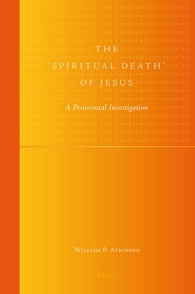William Atkinson: The Spiritual Death of Jesus
 William P. Atkinson, The ‘Spiritual Death’ of Jesus: A Pentecostal Investigation, Global Pentecostal and Charismatic Studies series (Brill, 2009), 304 pages, ISBN 9789004171992.
William P. Atkinson, The ‘Spiritual Death’ of Jesus: A Pentecostal Investigation, Global Pentecostal and Charismatic Studies series (Brill, 2009), 304 pages, ISBN 9789004171992.
William P. Atkinson tackles the controversial issue of the supposed spiritual death of Jesus from a firm Pentecostal perspective, being an ordained minister in the Elim Pentecostal Church in the UK. He spent seven years as the president in his denomination’s theological college, and is presently associated with the London School of Theology.
This book under review won the annual book award from The Foundation for Pentecostal Scholarship. When one reads through it, it is easily observed why this distinction was given.
At the very beginning of the book, the author lets you know where he stands, and the conclusions to which he has arrived. Taking the theological appraisal farther than any previous research to date, Atkinson counsels that Pentecostals would experience unnecessary damage by adopting this aberrant theology, and thus be drawn away from the foundations of traditional Christianity. His advice is to reject the bulk of the teaching of JDS (Jesus Died Spiritually).
Does the teaching that Jesus died spiritually stand up against historic Christianity?
Because the teaching of JDS is central to the Word of Faith, this book, in a sense, also serves as a critique of that movement. The Word of Faith movement cannot be classified as a single denomination, but nevertheless has greatly influenced Pentecostals throughout the world by means of their mass media techniques (TV, radio, publications, Internet, etc.). Who can calculate the number of independent, Pentecostal or charismatic churches that have embraced these teachings? This spread of inaccurate interpretations is an obvious concern to the author.
In particular, Atkinson focuses on three individuals: E. W. Kenyon, Kenneth E. Hagin and Kenneth Copeland. Kenneth E. Hagin is the main person who initiated the Word of Faith movement, leaning heavily on the writings of E. W. Kenyon. Kenneth Copeland is still alive and continues to advance this teaching. These three men have articulated the JDS doctrine the most comprehensively and to more of an extent than any of their followers.
Indeed, many of their disciples have picked up on this teaching and taught it in different measures, even modifying it. But the basic foundations have been strongly laid by these three men. Many people have unconsciously assumed this teaching, thinking it is orthodox.
Atkinson insists that this whole theological stance only serves to misrepresent the incarnation, the role that Satan played in the crucifixion, and the events that transpired between the cross and the resurrection.
Category: Biblical Studies, Fall 2015


